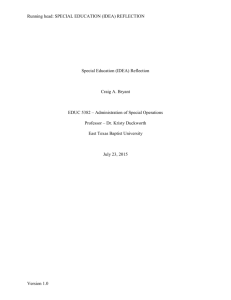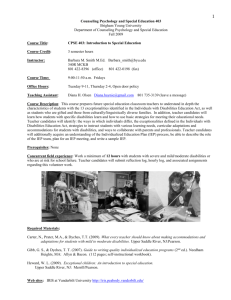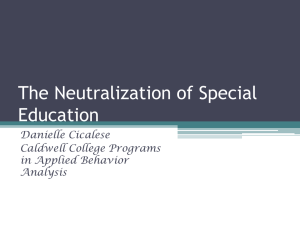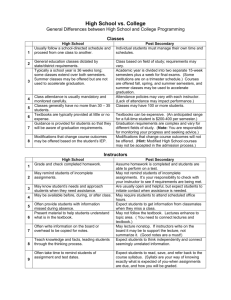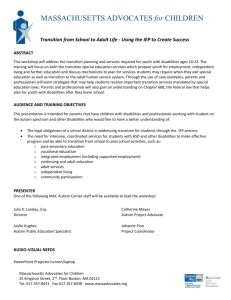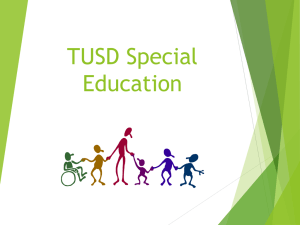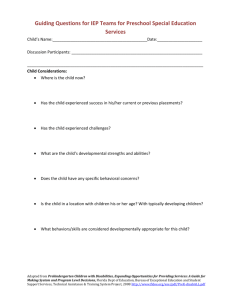Counseling Psychology and Special Education 400
advertisement
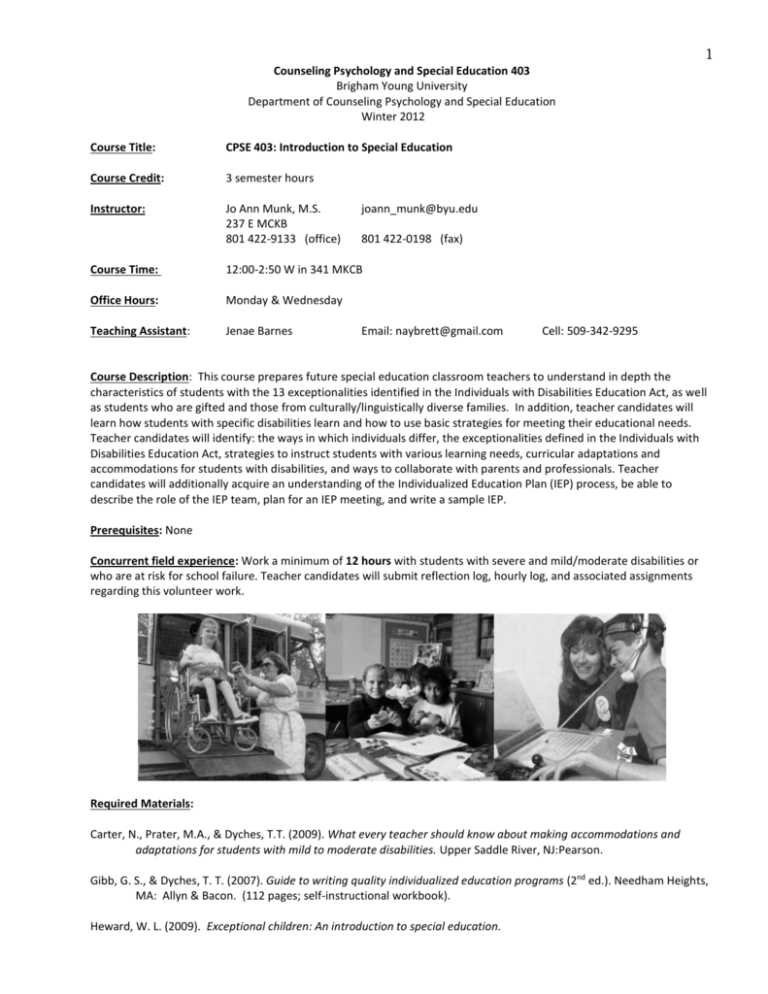
1 Counseling Psychology and Special Education 403 Brigham Young University Department of Counseling Psychology and Special Education Winter 2012 Course Title: CPSE 403: Introduction to Special Education Course Credit: 3 semester hours Instructor: Jo Ann Munk, M.S. 237 E MCKB 801 422-9133 (office) joann_munk@byu.edu 801 422-0198 (fax) Course Time: 12:00-2:50 W in 341 MKCB Office Hours: Monday & Wednesday Teaching Assistant: Jenae Barnes Email: naybrett@gmail.com Cell: 509-342-9295 Course Description: This course prepares future special education classroom teachers to understand in depth the characteristics of students with the 13 exceptionalities identified in the Individuals with Disabilities Education Act, as well as students who are gifted and those from culturally/linguistically diverse families. In addition, teacher candidates will learn how students with specific disabilities learn and how to use basic strategies for meeting their educational needs. Teacher candidates will identify: the ways in which individuals differ, the exceptionalities defined in the Individuals with Disabilities Education Act, strategies to instruct students with various learning needs, curricular adaptations and accommodations for students with disabilities, and ways to collaborate with parents and professionals. Teacher candidates will additionally acquire an understanding of the Individualized Education Plan (IEP) process, be able to describe the role of the IEP team, plan for an IEP meeting, and write a sample IEP. Prerequisites: None Concurrent field experience: Work a minimum of 12 hours with students with severe and mild/moderate disabilities or who are at risk for school failure. Teacher candidates will submit reflection log, hourly log, and associated assignments regarding this volunteer work. Required Materials: Carter, N., Prater, M.A., & Dyches, T.T. (2009). What every teacher should know about making accommodations and adaptations for students with mild to moderate disabilities. Upper Saddle River, NJ:Pearson. Gibb, G. S., & Dyches, T. T. (2007). Guide to writing quality individualized education programs (2nd ed.). Needham Heights, MA: Allyn & Bacon. (112 pages; self-instructional workbook). Heward, W. L. (2009). Exceptional children: An introduction to special education. 2 Upper Saddle River, NJ: Merrill/Pearson. Web sites: IRIS at Vanderbilt University http://iris.peabody.vanderbilt.edu/ Guiding Framework: As a department, we embrace the Interstate New Teacher Assessment and Support Consortium (INTASC) Standards as our guiding framework for preparing teacher candidates. The Interstate New Teacher Assessment and Support Consortium (INTASC) Standards: The INTASC standards center on five major propositions: (1) Teachers are committed to students and their learning. (2) Teachers know the subjects they teach and how to teach those subjects to diverse learners. (3) Teachers are responsible for managing and monitoring student learning. (4) Teachers think systematically about their practice and learn from experience. (5) Teachers are members of learning communities. Course Objectives Content Covered INTASC and CEC Standards Assessment 1. Describe the ways in which people differ, learning characteristics and special learning needs. 3: Diverse Learners CC1K5 CC1K10 CC5K9 CC6K2 CC6K3 CC9K1 Disability Awareness Final Project Practicum Reflection Log 2. Define special education and describe the legal structure of services for individuals with disabilities, including the Individuals with Disabilities Education Act. 3. Articulate issues related to the identification of students with disabilities, referral and placement and the need to provide differing levels of support. 4. Articulate issues related to collaboration in special education. Identify the skills for effective collaboration. 5. Describe policies and programs for young children; define elements of the Child Find system. 6. Describe the steps in the Individualized Education Program (IEP) process. 7: Planning Instruction CC1K8 CC8K2 GC1K7 Continuum of Placements Final Project 3. Diverse Learners GC1K1 GC8K2 GC3S1 RTI module 10: Collaboration, Ethics, and Relationships Continuum of Placements Final Project 2: Student Development EC1K3 Practicum Reflection Log Final 7: Planning Instruction CC3K3 RTI IRIS Module Gibb & Dyches workbook Final 7. Describe the characteristics, prevalence, and educational implications for students with specific learning disabilities, speech or language impairment, mental retardation, and emotional disturbance. 8. Describe the characteristics, prevalence, and educational implications for students with other health impairments, orthopedic impairment, visual impairments, autism, traumatic brain injury, deaf/blindness, and developmental delay. 9. Describe the effects of cultural, ethnic, and language diversity on the education of individuals with disabilities 10. Identify strategies for accommodating to meet individual student needs. 3: Diverse Learners CC1K5 CC1K9 CC2K3 CC10K4 Practicum Reflection Log Disability Awareness Final Project 3: Diverse Learners CC1K5 CC1K9 CC2K3 CC10K4 Practicum Reflection Log Disability Awareness 3: Diverse Learners CC1K5 GC1K7 CC3K5 CC3K4 7: Planning Instruction CC1K9 CC10K4 Practicum Reflection Log Final Project Tier 2 Intervention Plan Final Project 3 10. Demonstrate the ability to use assessment results to make instructional decisions. 11. Complete a 12-hour field experience involving volunteer service with four students with disabilities (2 at each site) and submit assignments regarding the experience. Receive Special Education Referral Determine Eligibility Teachers Oversee IEP Planning When Necessary 7: Planning Instruction Final Project 3: Diverse Learners CC1K5 CC1K9 CC1K10 CC3K3 CC3K4 CC6K2 CC6K3 CC10K4 GC1K7 Practicum Reflection Log Final Project Course Content The figure illustrates the visual model for the course. In this course, you will learn that you have a responsibility to oversee the referral and evaluation process for students who may qualify for special education services. As a teacher candidate, you will learn how to evaluate the academic/social performance of your students and how to initiate interventions when students are at-risk for failure. You will learn how to make instructional accommodations/adaptations that meet the educational needs of students who are receiving special education services. Throughout the IEP process, you will collaborate with general education teachers and parents to ensure that an appropriate education is provided for students with exceptional learning needs. Collaborate to Develop Appropriate Instruction with Necessary Accommodations Consistently Monitor and Report Student Progress Learning Outcomes (CPSE 403 – http://learningoutcomes.byu.edu) Collaboration: Candidates work effectively with parents, professionals, paraprofessionals, and others in the school and community to help students with disabilities achieve their IEP goals. Interpersonal Relations: Candidates work with students, parents, professionals, paraprofessionals, and others in the school and community with kindness and respect regardless of their diverse backgrounds. Professional Practice: Candidates fulfill all duties and assignments, comply with all education laws and policies, and continue to improve professional practice. Success in the Course Hopefully all students enrolled in this course will achieve desired outcomes. Successful students in this course attend class, read the lessons, and complete assignments on time. 4 Completing work on time is especially important. Typically, this is a busy term for students. If you get behind early in the term, it becomes increasingly difficult to catch up. Turn in work on time. Students should contact the professor when they encounter problems completing assignments or attending class. Methodologies/Teaching Strategies Course learning includes reading the lessons, completing mastery checks, accessing internet sites, viewing electronic video presentations, and working with a child with special needs, attending class and participating in instructional activities in class. Assignments/Assessments Connections Journal Field Experience Assignments o Practicum Reflection Log o Signed Cooperating Teacher Contract o Signed Hour Log o Professionalism Evaluation Point Value 50 (10 @5 points each) 60 points 20 (2 @10 points each) 10 points 10 (2 @5 points each) Course Assignments o Disability Awareness Assignment o IRIS Response-to-Intervention Module o Tier-2 Intervention Plan o Continuum of Placements Assignment o IEP Workbook Assignment Participation Points Final Project Course Evaluation TOTAL POINTS 10 points 10 points 10 points 20 points 45 points 20 points 100 points 5 points 370 Your letter grade for the course will be calculated using the following percentages: A 95 - 100 B+ 87 - 89 C+ 77 - 79 D+ 67 - 69 A- 90 - 94 B 83 - 86 C 73 - 76 D 63 - 66 B- 80 - 82 C- 70 - 72 D - 60 - 62 Course Assignment Summary Field Experience: You will spend 12 hours at two approved sites, six hours at a severe site and six hours at a mild/moderate site. Teacher candidates are encouraged to visit the sites in teams of two. You will create your own schedule and make your own arrangements with the Cooperating Teacher. It is recommended that you plan to attend each site three times for two hours, and that you try to include both a secondary and an elementary site in your schedule. Reading Assignments: Reading materials include: Exceptional Children: an Introduction to Special Education, What Every Teacher Should Know About (WESTKA) Making Accommodations book, and materials posted on blackboard. Connections Journal Assignments: For each assigned chapter, students will complete the Connections Journal assignment (1/2 -1 page single spaced reflection on assigned readings). Course Assignments: Students will complete the following assignments. The first four assignments listed below will each be approximately 1-2 pages in length. 1. Disability Awareness Assignment 2. The IRIS Response‐to‐Intervention Module and Assessment 3. Tier 2 Intervention Plan (based on behavioral and academic scenario) 4. Continuum of Placements Assignment 5. Gibb and Dyches IEP Workbook 6. Practicum Reflection Log, 2 Cooperating Teacher Contracts, and Cooperating Teacher’s Professional Evaluation 5 Participation Points: At the discretion of the instructor, points will be given for in-class assignments throughout the semester. Final Project: The final for the course is a collaboration assignment. Students will work with a peer to develop a hypothetical case study. Due Dates: Due dates are indicated on the course schedule. Assignments: Assignments are to be handed at the beginning of class on the due date designated by the instructor. (This applies in the case of absences, also.) Assignments will be lowered 10% for each day late. No assignments will be accepted after the last day of class. Course Evaluation: Complete the course/instructor evaluation found through Route Y. Course Expectations • Course Work: Written work is expected to be professionally written. Please proofread all work prior to submission. Assignments should typed and be free from spelling, grammatical, and typographical errors. • Assignments: All written work must reflect the efforts of the individual student unless it is a group assignment. • Time Commitment: University standards are 2 to 3 hours of out-of-class work for each credit hour. For this class you may spend 6 to 9 hours a week completing course work. • Personal Responsibility: Students are expected to check the online course information and/or the course syllabus for clarification regarding assignments prior to contacting the instructor. Students are responsible for completing course work and for managing learning behavior in and out of class. If you encounter problems completing course work, it is your responsibility to contact the instructor to resolve issues. • Classroom Behavior: Reading and sending emails, completing work for other courses while in class, working on puzzles, or any other multi-tasking type activity is not an appropriate use of the learning opportunity available in class. Cell phones should be turned off prior to class. • Professionalism: You are expected to behave in a professional manner. If you have concerns about the course, you should discuss your concerns privately with the instructor. Methodologies/Teaching Strategies: Course learning includes reading the lessons, completing mastery checks, accessing internet sites, viewing electronic video presentations, and working with a child with special needs, attending class and participating in instructional activities in class. Other Critical Information: Please be courteous to all members of the class by turning off cell phones and beepers during class time. As a BYU student, each of you has access to an account. Please obtain your account information and inform us of your e-mail address. You are also expected to learn how to use Blackboard to access information for this course. Policies and general information http://education.byu.edu/cpse/documents/general%20syllabi%20department%20information%20%28Repaire d%29.pdf Mission Statement of the BYU Special Education Programs Students with Disabilities Statement on Diversity Preventing Sexual Harassment Bibliography Alberto, P. A. & Troutman, A. (2009). Applied behavior analysis for teachers. Upper Saddle River, NJ: Merrell/Pearson. 6 Anderson, P. L. (1997). Case Studies for Inclusive Schools. Austin, TX: PRO-ED, Inc. Garguilo, R. M. (2009). Special education in contemporary society: An introduction to exceptionality. Los Angeles, CA: Sage Publications. Hardman, M. L., Drew, C. J., &Egan, W. L. (2008). Human exceptionality: School community, and family (9th Ed.), Boston: Houghton Mifflin. Lenz, B. K., Deshler, D. D. (2004). Teaching content to all: Evidence-based inclusive practices in middle and secondary Schools. Boston: Pearson. Mastropieri, M.A., & Scruggs, T.E. (2007). The inclusive classroom: Strategies for effective instruction. Upper Saddle River, NJ: Pearson. Prater, M.A. (2008). Chapter 2: Laws and reform impacting special education from: Teaching strategies for students with mild to moderate disabilities. Boston: Pearson. 7 Course Calendar CPSE 403 Winter 2012 Class Jan 4 Focus Reading(s) Connection Journal Course and Field Assignment(s) 1 1st Cooperating Teacher Contract Introduction and Syllabus Disability Awareness Course Schedule Jan 11 Jan 18 Jan 25 Feb 1 Feb 8 Feb 15 Feb 22 Feb 29 Overview of Special Ed Law Placements, 504 and IDEA Pre-Referral Heward Ch. 1 & (2) Learner Characteristics WETSKA Part 1 Learner Characteristics High Incidence Disabilities: Learning Disabilities Heward Ch. 5 Emotional Disturbance Heward Ch. 6 High Incidence Disabilities: Communication Disorders Heward Ch. 8 High Incidence Disabilities: Intellectual Disabilities Katie Steed, BYU Low Incidence Disabilities: Visual and Hearing Impairments Orthopedic Impairment and Other Health Impairments Teri Davis, Alpine District Low Incidence Disabilities: Severe and Multiple Disabilities and Traumatic Brain Injury Heward Ch. 4 Autism Michele Thompson Special Services Heward Ch. 7 Gifted and Talented Pam Turley Nebo District Heward Ch. 13 Multicultural Issues, Poverty, Early Intervention Heward Ch. 14 RTI and PBS IRIS RTI Modules Part 1 & 2 Disability Awareness Assignment Discussion Board Post 2 3 Heward Ch. 9 & 10 Heward Ch. 11 IRIS Disability Module 1 Visual Disabilities Discussion Board Post 4 2nd Cooperating Teacher Contract 1st CT Professionalism Evaluation Practicum Reflection Journal Heward Ch. 12 5 Continuum of Placements Assignment Discussion Board Post 6 Iris Response to Intervention Module and Assessment RTI and PBS Mar 7 IEP Process and the IEP Team Overview of Referral Process Heward Ch. 2 7 8 Mar 14 Writing IEPS PLAAFPS and Goals Gibb & Dyches text IEP Workbook due WETSKA Part III WETSKA Part III IRIS Module—Classroom Assessment (Part 1): An Introduction to Monitoring Academic Achievement in the Classroom Goalview Mar 21 Mar 28 Apr 4 Reporting Student Progress Assessment Accommodations for IEPs Planning IEP Meetings Megan Langford, Nebo District Classroom Accommodations: Academic and Social/Behavioral 8 WETSKA Part IV 9 Practicum Reflection Journal Question for Parent Panel Parent Panel Heward Ch. 3 10 2nd CT Professionalism Evaluation Hourly Log of Practicum Attendance Form Classroom approaches and practicum Apr 11 Summary and Presentations Apr 16 Final Project Submission 2:30 pm to 5:30 pm Project Presentations

